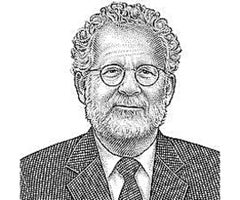MI SELECCIÓN DE NOTICIAS
Noticias personalizadas, de acuerdo a sus temas de interés

Only the trans-Atlantic alliance can counter Beijing’s moves in the Pacific.
What will the trans-Atlantic alliance look like in a world focused on the Indo-Pacific? That, more than President Trump’s unpredictable diplomacy, is the question that haunts Europe. During the Cold War, protecting Europe from Soviet aggression was Washington’s highest foreign-policy priority. That didn’t only mean that the U.S. put troops in Europe. Washington took European opinions seriously, engaged with Europeans, cut deals with them and was willing to make concessions to preserve alliance unity.
Clearly, some of that has changed. The next U.S. president may not share Mr. Trump’s undiplomatic instincts or his affinity for Brexiteers such as Nigel Farage and anti-Brussels figures like Hungary’s Viktor Orbán. But will he or she engage in the ritualistic ceremonies of diplomatic consultation with the various chancellors, presidents, commissioners and high representatives that Europeans so love? When America’s most urgent foreign policy worries involve smoothing over Japanese-Korean spats or facing down China in the Taiwan Strait, just how relevant will Europe be? When Europe calls Washington, will anybody answer the phone?
The French like to say they are a Pacific nation, thanks to Tahiti and other outposts, but it takes more than a sprinkling of islands, however idyllic, to make you a serious factor in Pacific politics. From a military standpoint, the European powers—and NATO itself—won’t play a large role in the Indo-Pacific zone. Nor will European ideology or Europe as a model have much appeal there. The memories of colonialism are too strong, and many Asian countries see the slow-growth, high-regulation European social model as a trap to avoid, not a goal to be reached.
Yet as China looms larger, a new trans-Atlantic consensus is forming. German Chancellor Angela Merkel, in one of her rare political missteps, decided last month to allow China’s Huawei to supply components for Germany’s 5G internet. Americans made the usual protests and threats, to be met by the usual refusals. But the matter didn’t end there. Delegates to her party’s conference last week revolted, adopting a resolution that could lead to a Bundestag vote to block Huawei from Germany’s 5G rollout. Prominent Social Democrats, the center-left party uneasily allied with Mrs. Merkel’s Christian Democrats, agree. Chinese companies cannot be trusted with German data.
The convergence between European and U.S. views on China is far from complete. France has refused to exclude Huawei from its 5G program, and other European governments as well as many European companies still see China through rose-tinted lenses. But opinions are changing. Like Americans, Europeans sympathize with Hong Kong’s democracy movement, and are horrified by Beijing’s treatment of the Tibetans and Uighurs. The Federation of German Industries has been voicing sharp criticism of Chinese business practices for the past year.
There is another force pushing Americans and Europeans closer together: Vladimir Putin, who appears to have resigned himself to a full-fledged alliance with China. Russia’s disruptive agenda in Europe, ranging from the annexation of Crimea to efforts to influence European elections through disinformation, has always suffered from a lack of money that is the curse of Russian power projection. A perception that Russian activity in Europe is more of a nuisance to the U.S. than a strategic threat has gained ground in some neo-isolationist circles. But as China makes major investments in Greece and across Southern and Eastern Europe, that perception could change. The closer Russia and China are aligned, the more important Europe’s Russia problems become for a China-focused U.S. foreign policy.
The Indo-Pacific isn’t Las Vegas—what happens there doesn’t stay there. As China’s economic, political and military reach expands in Africa, Latin America and the Middle East, European as well as U.S. interests will be affected. Efforts by China to export its method of authoritarian governance backed by high-tech surveillance will pose a serious threat to a vision of the open society that Europeans and Americans mostly share.
One hates to say anything so obvious, but world politics is a global endeavor. During the Cold War, America’s main focus was on Europe, but Japan and South Korea were important allies without whose support and counsel the Cold War would have been much harder to win.
The real question isn’t whether the U.S. will take the problems of the Indo-Pacific too seriously and write off its old allies in Europe. It is whether Americans and Europeans will recognize the global nature of the challenge before us.
About this, I am an optimist. The Americans who best understand the potential threats emerging from China also know that without Europe’s help it will be difficult and perhaps impossible to prevail. The harder Americans think about China, the more they will care about Europe. If enough Europeans share U.S. concerns about Beijing, the Western alliance will remain a vital force even as the world’s political center of gravity shifts to the Indo-Pacific.
By Walter Russell Mead
Los cambios tienen como objetivo combatir el aumento de la violencia que ha aparecido en los titulares internacionales
Rechazaron las propuestas como liberalizar el mercado laboral y permitir el arbitraje internacional para los inversionistas extranjeros
Analistas ven que los malos datos económicos y elevados precios de los consumidores le ayudarían a Evo Morales para volver al poder